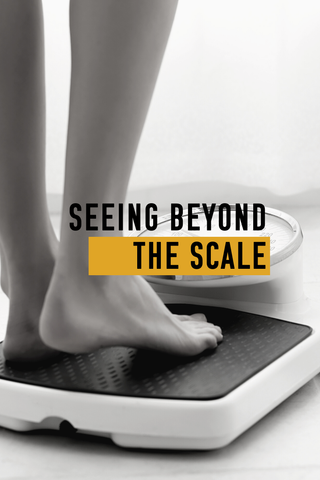
*Disclaimer: All content and information in this blog is for informational and educational purposes only.
There is a lot of conflicting advice about the best way to lose weight whether or not you have type 1 diabetes. The information available can oftentimes be a bit extreme like cutting out major food groups, eating precise macronutrients daily, fasting for hours, or even intense exercise regimens. While these may contribute to weight loss initially, they are often not realistic nor sustainable to maintain and usually result in slowing down your metabolism that makes losing weight even more difficult. In this blog post, we are going to walk you through exactly what you need to know about losing weight with type 1 diabetes to support you in reaching your weight-loss goals.

Look Beyond the Scale
Losing weight is complex and complicated and when you first start out on your weight loss journey, you may have a specific number in mind about how many pounds you would like to lose. But, some people are surprised to find that when they make diet and lifestyle changes that the scale actually goes up.
Does this mean that all of the hard work and energy you have put into things has been for nothing? Absolutely not. Majority of results that you achieve from diet and lifestyle changes often happen beyond the scale. Here are some things to ask yourself when starting out on your weight loss journey that can keep you centered at seeing progress beyond the scale:
- What is the intention of your weight loss goal?
- What will being at that weight feel like?
- What emotions are you looking to feel about your weight and body?
- Do you want to feel stronger? Work on endurance? Be able to complete daily tasks?
- Are you looking for more daily energy?

You Don’t Have to Cut Carbs
One of the biggest assumptions made about losing weight with diabetes is that you need to cut out carbohydrates from your diet. Carbohydrates provide your body with energy and when you cut back on carbohydrates it can actually do more harm than good, especially for your weight loss goals. When you cut back on carbohydrates, you likely aren’t meeting your daily energy needs which can put a lot of stress on your body. This added stress can lead to hormonal imbalances, loss of menstruation, and lower your carbohydrate tolerance. Instead of cutting out carbohydrates, try looking for patterns or behaviors in your diet first:
- Are you having big gaps between your meals?
- Are you snacking a lot?
- What is your style of eating?
- Do you eat more or less when stressed?
- What can you tweak or prioritize in your diet that supports your goals?

Insulin Doesn’t Cause Weight Gain
When people with diabetes are diagnosed, they often experience unintentional weight loss as a side effect of their body not being able to properly utilize the glucose from their diet. Once they start taking insulin, their body is able to start absorbing nutrients that their body has been starved from which results in weight gain. This weight gain is bringing the body back to their baseline weight and eventually the weight gain will cease.
Insulin is a hormone that helps the body control the amount of sugar in the blood. When you are diagnosed with diabetes, weight loss is a common side effect as your body has not been able to properly utilize the glucose in your bloodstream. Once you start taking insulin, your body is not able to utilize that glucose for energy or storage. This often results in weight gain, but it is important to note that this weight gain was healthy since your body was previously starved from energy. As you become more efficient with your self-management, the weight gain will cease as your body now has a stable energy supply.
The only way that insulin is able to cause weight gain is when there is extra glucose in the blood that you don’t need for energy. An important part of avoiding weight gain is by monitoring your blood sugar and taking efficient insulin to maintain your blood sugar levels. You should never stop taking insulin because of weight gain. Insulin was prescribed for a good reason and if you have concerns about weight gain you should bring them to your healthcare provider.

Work on Reducing Your Stress Levels
When your body is under stress, it can significantly impact your ability to lose weight. Stress can manifest in many different ways, whether it is stress from not eating enough, drinking enough water, getting enough sleep, or never giving your body a day to rest. When the body is in a state of stress, it will release the hormones called cortisol. High levels of cortisol can slow down your metabolism making it difficult to lose weight. Working on reducing or managing your stress levels can combat the stress-related weight changes.

Work with a Registered Dietitian
We all have expectations about weight loss and when you get started in your journey, you may find that you are having a hard time meeting your expectations and reaching your goals. When working with a registered dietitian, they can support you with a personalized health plan to meet your weight loss goals. It is especially important to find a registered dietitian who has experience with diabetes management (like a CDCES) as insulin adjustments may be necessary while on a weight loss plan. Finding a local diabetes educator or registered dietitian can help support you with your weight loss goals.
Weight loss can be difficult with diabetes, but it isn’t impossible. Listen to Episode 26: Not Meeting your Weight Loss Goals with T1D? This Ones for You where Registered Dietitian and Certified Diabetes Educator, Jessica Hrdlicka, discusses how you can approach your weight loss goals without restriction. Available now on Spotify and Apple Podcasts.






























